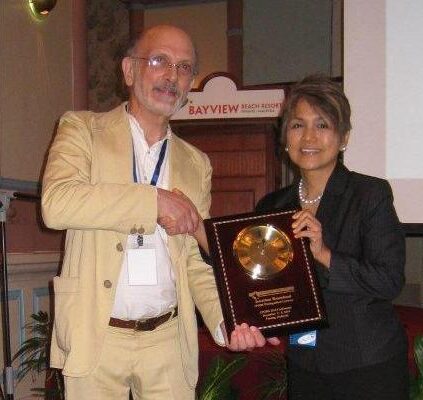Jonathan Rosenhead
Title of Presentation: Is Operational Research Sustainable?
APORS Conference
December 2010
Penang, Malaysia
Abstract:
Climate change is a subject that attracts controversy because of its complexity, and because it is potentially so important. The talk summarises the basic mechanisms leading to an accumulation of greenhouse gases (notably CO2) in the atmosphere which reduces the transmission of heat away from the earth. Among the main factors in this process is that CO2 is generated in large quantities by burning fossil fuels; and its absorption is reduced by de-forestation.
Because CO2 is long-lasting, world temperatures will continue to increase for very many years even if there were to be a sharp decrease in emissions – of which there is no sign despite a dozen years of trying to achieve it. The potential consequences of a rise of 2% in world temperatures are 30% loss of species, island nations submerged, and mass malnutrition, poverty and migration. The chances of keeping the average temperature rise to 2% are becoming remote. We will need both mitigation (to reduce the scale of the increase) and adaptation (to better live with the consequences). This is a problem of supreme importance, on which the quality and quantity of life of future generations depends.
Why should this concern OR? Choose any two out of
i) OR has no automatic right to survive if it is not performing important tasks for our society
ii) OR has some generic skills that ought to be relevant to the situation
We should find historical motivation by taking a step back to the birth of OR at the outset of World War II. This was an international crisis where defeat would have meant the triumph of fascism over Europe at least. The talk takes the Battle of the Atlantic (1942-3) to exemplify the creative achievements of the first operational researchers, dealing with problems that had never been tackled before; with no established techniques, they developed the tools they needed.
We are again at a point of international, no global, crisis. In some ways we are better off than those first operational researchers. We have the accumulated quantitative craft skills of the profession. Just a few of our tool-bag of techniques might be relevant – those which can deal with situations without a single decision maker or an agreed set of objectives; those which deal with systematic feedback; and we now have interactive model-based methods (Problem Structuring Methods) that can handle complexity and interactive dialogue while diverse stakeholders try to make progress with a common problem.
The talk makes some initial suggestions about ways in which OR might be able to make a contribution to both the debate about mitigation, and the arrangements for adaptation. Can OR be sustainable if the organisation of society it serves is not?
Bio
Jonathan Rosenhead was born in England, and educated at the University of Cambridge and University College London in Mathematics and Statistics respectively. Early operational research (OR) employment was in the UK steel industry in Sheffield and in management consultancy in London (both groups founded by Stafford Beer), as well as in the group led by Russ Ackoff at the University of Pennsylvania. Beer and Ackoff are both major figures who found that the limitations of operational research as practised in the 1960’s and 70’s excluded it from many social problems of significance, and as a result left OR for the systems movement.
Rosenhead has remained within OR, and has been one of the significant figures working to develop methods appropriate to ‘messy’ problems characterised by multiple stakeholders, uncertainties, intangibles and conflict.Rosenhead has been a teacher at the London School of Economics since 1967, and Professor of Operational Research there since 1987. He was awarded the President’s Medal of the British Operational Research Society in 1979, its Goodeve Medal in 1987, and its Beale Medal in 1992. He was President of the Society in 1986-7.
His edited collection Rational Analysis for a Problematic World published in 1989 was the book which established Problem Structuring Methods as a group of methods for messy or ‘wicked’ problems. This was substantially revised and updated in Rational Analysis for a Problematic World Revisited, with John Mingers (Wiley, 2001). He has worked and published extensively on the application of OR in third world development; in health care; and on the history of OR. He is also credited with launching the community operational research movement, which provides decision support for grass roots organisations

